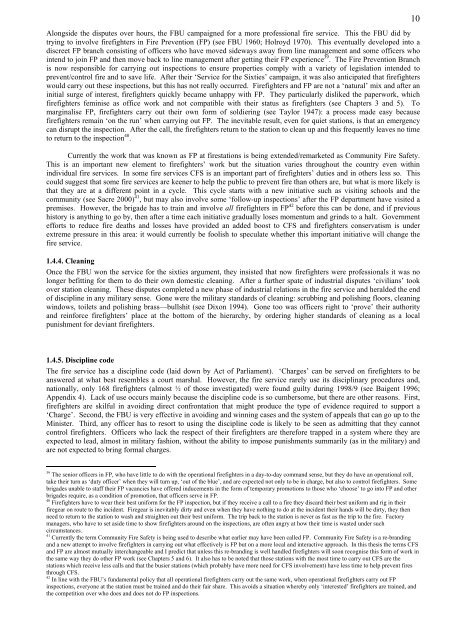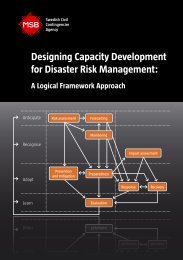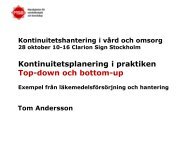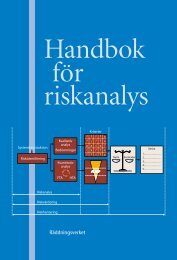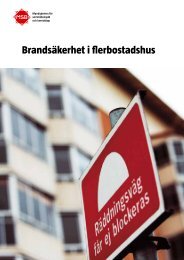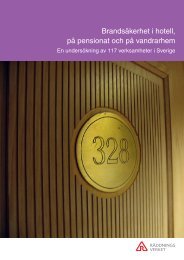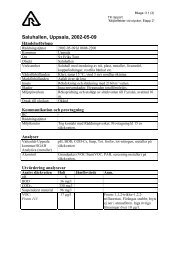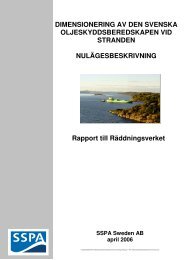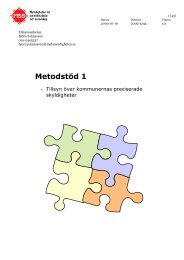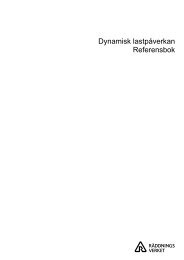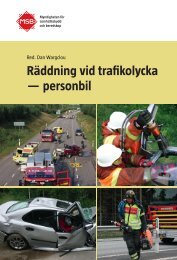One more last working class hero
One more last working class hero
One more last working class hero
Create successful ePaper yourself
Turn your PDF publications into a flip-book with our unique Google optimized e-Paper software.
Alongside the disputes over hours, the FBU campaigned for a <strong>more</strong> professional fire service. This the FBU did by<br />
trying to involve firefighters in Fire Prevention (FP) (see FBU 1960; Holroyd 1970). This eventually developed into a<br />
discreet FP branch consisting of officers who have moved sideways away from line management and some officers who<br />
intend to join FP and then move back to line management after getting their FP experience 39 . The Fire Prevention Branch<br />
is now responsible for carrying out inspections to ensure properties comply with a variety of legislation intended to<br />
prevent/control fire and to save life. After their ‘Service for the Sixties’ campaign, it was also anticipated that firefighters<br />
would carry out these inspections, but this has not really occurred. Firefighters and FP are not a ‘natural’ mix and after an<br />
initial surge of interest, firefighters quickly became unhappy with FP. They particularly disliked the paperwork, which<br />
firefighters feminise as office work and not compatible with their status as firefighters (see Chapters 3 and 5). To<br />
marginalise FP, firefighters carry out their own form of soldiering (see Taylor 1947): a process made easy because<br />
firefighters remain ‘on the run’ when carrying out FP. The inevitable result, even for quiet stations, is that an emergency<br />
can disrupt the inspection. After the call, the firefighters return to the station to clean up and this frequently leaves no time<br />
to return to the inspection 40 .<br />
Currently the work that was known as FP at firestations is being extended/remarketed as Community Fire Safety.<br />
This is an important new element to firefighters’ work but the situation varies throughout the country even within<br />
individual fire services. In some fire services CFS is an important part of firefighters’ duties and in others less so. This<br />
could suggest that some fire services are keener to help the public to prevent fire than others are, but what is <strong>more</strong> likely is<br />
that they are at a different point in a cycle. This cycle starts with a new initiative such as visiting schools and the<br />
community (see Sacre 2000) 41 , but may also involve some ‘follow-up inspections’ after the FP department have visited a<br />
premises. However, the brigade has to train and involve all firefighters in FP 42 before this can be done, and if previous<br />
history is anything to go by, then after a time each initiative gradually loses momentum and grinds to a halt. Government<br />
efforts to reduce fire deaths and losses have provided an added boost to CFS and firefighters conservatism is under<br />
extreme pressure in this area: it would currently be foolish to speculate whether this important initiative will change the<br />
fire service.<br />
1.4.4. Cleaning<br />
Once the FBU won the service for the sixties argument, they insisted that now firefighters were professionals it was no<br />
longer befitting for them to do their own domestic cleaning. After a further spate of industrial disputes ‘civilians’ took<br />
over station cleaning. These disputes completed a new phase of industrial relations in the fire service and heralded the end<br />
of discipline in any military sense. Gone were the military standards of cleaning: scrubbing and polishing floors, cleaning<br />
windows, toilets and polishing brass—bullshit (see Dixon 1994). Gone too was officers right to ‘prove’ their authority<br />
and reinforce firefighters’ place at the bottom of the hierarchy, by ordering higher standards of cleaning as a local<br />
punishment for deviant firefighters.<br />
10<br />
1.4.5. Discipline code<br />
The fire service has a discipline code (laid down by Act of Parliament). ‘Charges’ can be served on firefighters to be<br />
answered at what best resembles a court marshal. However, the fire service rarely use its disciplinary procedures and,<br />
nationally, only 168 firefighters (almost ½ of those investigated) were found guilty during 1998/9 (see Baigent 1996;<br />
Appendix 4). Lack of use occurs mainly because the discipline code is so cumbersome, but there are other reasons. First,<br />
firefighters are skilful in avoiding direct confrontation that might produce the type of evidence required to support a<br />
‘Charge’. Second, the FBU is very effective in avoiding and winning cases and the system of appeals that can go up to the<br />
Minister. Third, any officer has to resort to using the discipline code is likely to be seen as admitting that they cannot<br />
control firefighters. Officers who lack the respect of their firefighters are therefore trapped in a system where they are<br />
expected to lead, almost in military fashion, without the ability to impose punishments summarily (as in the military) and<br />
are not expected to bring formal charges.<br />
39 The senior officers in FP, who have little to do with the operational firefighters in a day-to-day command sense, but they do have an operational roll,<br />
take their turn as ‘duty officer’ when they will turn up, ‘out of the blue’, and are expected not only to be in charge, but also to control firefighters. Some<br />
brigades unable to staff their FP vacancies have offered inducements in the form of temporary promotions to those who ‘choose’ to go into FP and other<br />
brigades require, as a condition of promotion, that officers serve in FP.<br />
40 Firefighters have to wear their best uniform for the FP inspection, but if they receive a call to a fire they discard their best uniform and rig in their<br />
firegear on route to the incident. Firegear is inevitably dirty and even when they have nothing to do at the incident their hands will be dirty, they then<br />
need to return to the station to wash and straighten out their best uniform. The trip back to the station is never as fast as the trip to the fire. Factory<br />
managers, who have to set aside time to show firefighters around on the inspections, are often angry at how their time is wasted under such<br />
circumstances.<br />
41 Currently the term Community Fire Safety is being used to describe what earlier may have been called FP. Community Fire Safety is a re-branding<br />
and a new attempt to involve firefighters in carrying out what effectively is FP but on a <strong>more</strong> local and interactive approach. In this thesis the terms CFS<br />
and FP are almost mutually interchangeable and I predict that unless this re-branding is well handled firefighters will soon recognise this form of work in<br />
the same way they do other FP work (see Chapters 5 and 6). It also has to be noted that those stations with the most time to carry out CFS are the<br />
stations which receive less calls and that the busier stations (which probably have <strong>more</strong> need for CFS involvement) have less time to help prevent fires<br />
through CFS.<br />
42 In line with the FBU’s fundamental policy that all operational firefighters carry out the same work, when operational firefighters carry out FP<br />
inspections, everyone at the station must be trained and do their fair share. This avoids a situation whereby only ‘interested’ firefighters are trained, and<br />
the competition over who does and does not do FP inspections.


